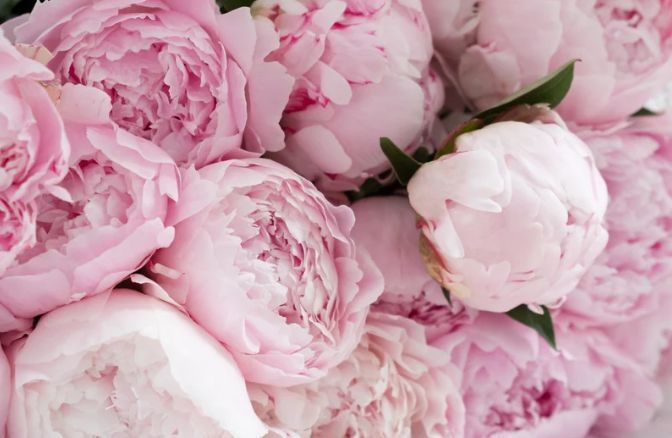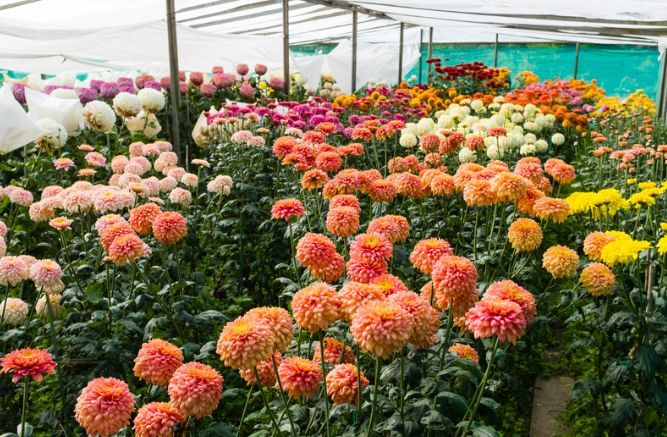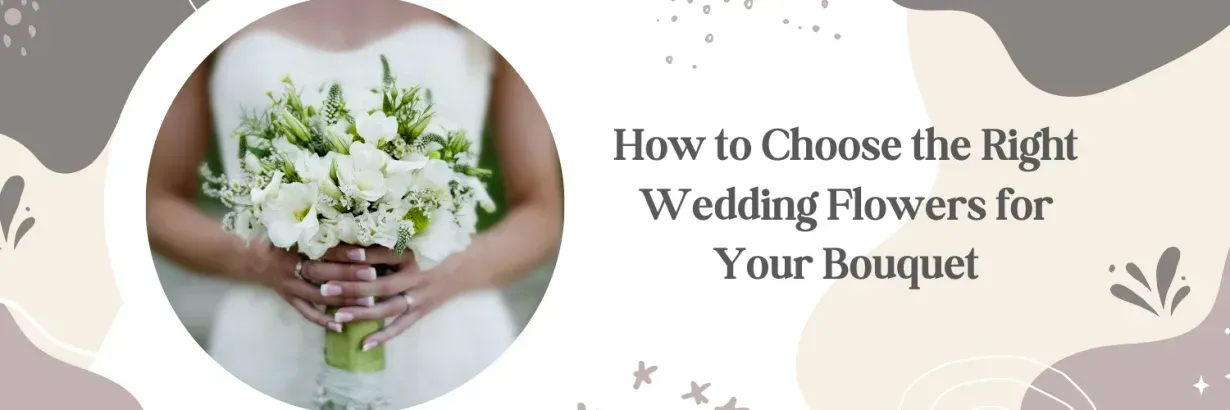
How to Choose the Right Wedding Flowers for Your Bouquet
Choosing The Best Flowers for Bouquet
Wedding flowers aren’t just pretty decorations. They’re packed with meaning and tradition, each flower telling a story. Your bouquet isn’t just an accessory—it’s a way to show off your style and personality. This guide will help you pick the perfect flowers for your big day, matching your vision, venue, and the season.
The Basics of Wedding Bouquets
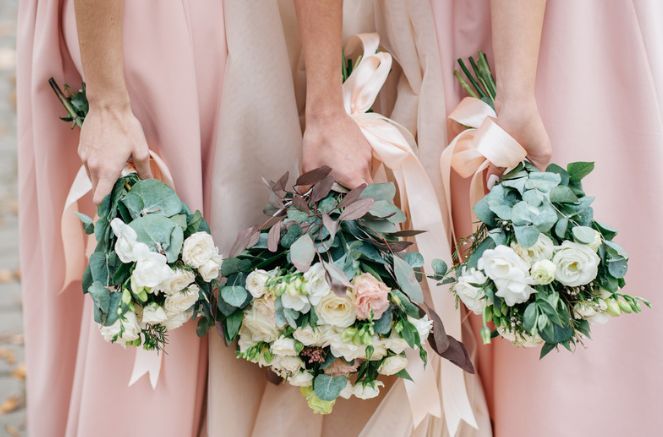
Types of Wedding Bouquets
Choosing the right bouquet shape and style is as essential as selecting flowers. The variety of bouquet types allows brides to find the perfect match for their wedding theme and personal style.
- Posy Bouquet: Ideal for minimalist brides, the posy bouquet is small, round, and usually consists of tightly packed flowers. It’s easy to hold and perfect for traditional and modern weddings.
- Cascade Bouquet: This dramatic bouquet type features flowers that flow downwards, creating a waterfall effect. It’s suited for formal weddings and adds a touch of elegance and grandeur.
- Round Bouquet: Classic and timeless, the round bouquet is more significant than a posy and has a perfect circular shape. It works well with various flowers and suits almost any wedding style.
- Hand-tied Bouquet: The hand-tied bouquet is an excellent choice for a more relaxed and rustic vibe. It looks like the flowers have been freshly picked and tied together, offering a more natural and informal feel.
Seasonal Flower Guide
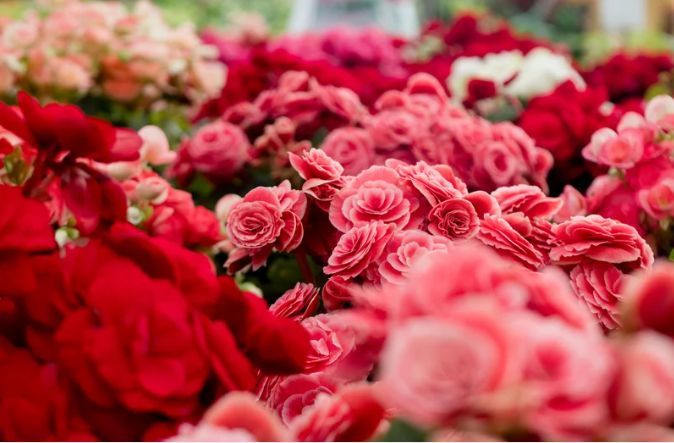
- Spring: Spring weddings can feature peonies, tulips, and lilacs, which are all in full bloom during this season.
- Summer: For summer weddings, consider using flowers like dahlias, hydrangeas, and sunflowers that thrive in the warm weather.
- Fall: Dahlias, chrysanthemums, and calla lilies are stunning choices for autumn bouquets, offering rich colours that match the season.
- Winter: Even in winter, there are beautiful options like amaryllis, ranunculus, and roses that can create a stunning bouquet.
Colour Scheme Considerations
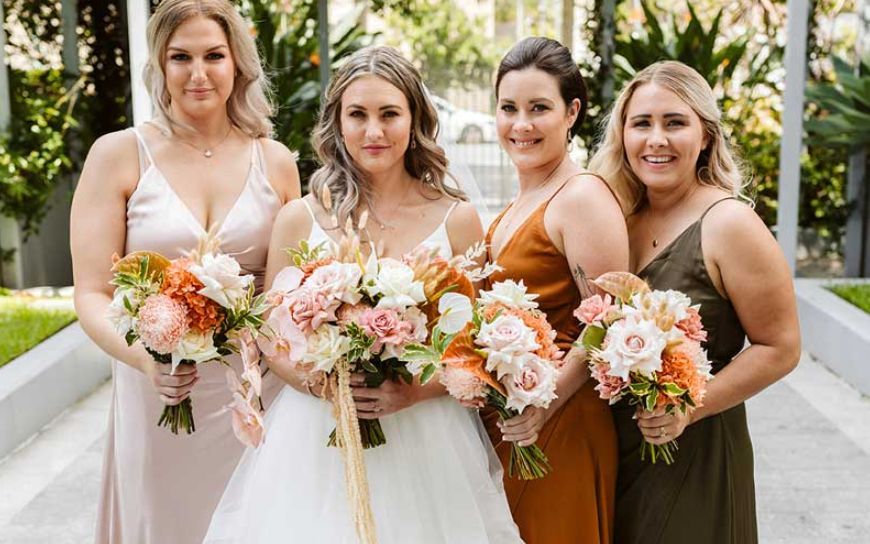
The colour of your wedding bouquet should complement the overall colour scheme of your wedding, adding to the visual harmony of your big day. The bouquet’s colours can echo the tones of the wedding decor, bridesmaid dresses, and even the venue’s palette.
- Soft and Romantic: For a soft and romantic theme, opt for pastels like blush pink, soft lavender, and pale yellow. These colours evoke a sense of gentleness and romance.
- Bold and Vibrant: If your wedding theme is bold and vibrant, choose flowers in rich shades like deep red, bright orange, and royal purple. These colours add energy and excitement to your bouquet.
- Neutral Tones: For weddings with a more subdued or rustic theme, consider flowers in neutral tones like white, cream, and soft green. These colours can create a sense of elegance and understated beauty.
Factors to Consider When Choosing Your Wedding Flowers
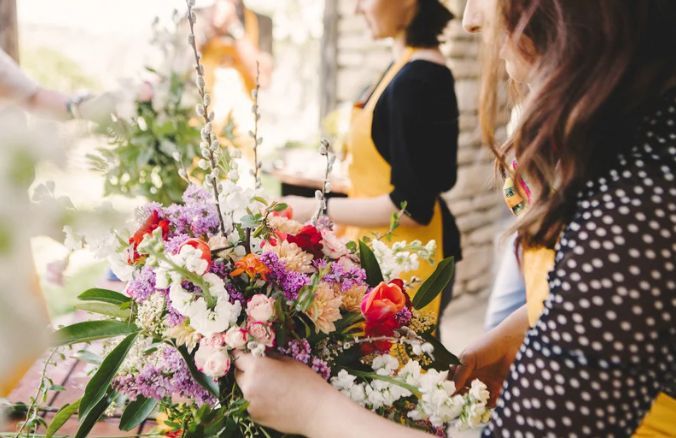
Selecting the right flowers for your wedding goes beyond aesthetics. It involves thoughtful consideration of the venue, personal symbolism, budget constraints, and practical concerns like scent and allergies. Each factor is crucial in ensuring your floral arrangements perfectly complement your wedding day.
Venue and Atmosphere
The setting of your wedding is a major determinant of the floral choices you’ll make. Each venue brings its own unique vibe and visual palette, which should harmonize with your flower selections.
- Grand Ballrooms: Luxurious and structured arrangements can add to the venue’s elegance for opulent settings like grand ballrooms. Consider flowers like orchids, roses, and calla lilies for a touch of sophistication.
- Beachside Settings: A beach wedding calls for more relaxed and vibrant floral arrangements. Tropical flowers like hibiscus, plumeria, and birds of paradise can withstand the beach’s natural elements and complement the scenic backdrop.
- Garden Weddings: Garden weddings offer a natural setting that pairs well with loose, wildflower arrangements. Incorporate flowers like lavender, daisies, and wild roses to enhance the garden’s natural beauty.
Budget Planning
Flowers can be one of the more significant expenses in a wedding budget, making planning crucial. Communicate openly with your florist about your budget and be flexible with your choices.
- Opt for Seasonal Flowers: Choosing flowers that are in season during your wedding can help reduce costs significantly.
- Incorporate Greenery: Greenery can add volume and texture to your arrangements at a lower cost than most blooms.
- Focus on Statement Pieces: Instead of elaborate arrangements at every table, consider investing in a few stunning statement pieces where they’ll have the most impact.
Scent and Allergies
The scent of your wedding flowers can enhance the atmosphere, but it’s important to consider the potential impact on you and your guests.
- Choose Wisely: If you or your guests are sensitive to fragrances, choose flowers with a mild scent or no fragrance, such as orchids or ranunculus.
- Communicate with Guests: If you’re set on fragrant flowers, consider informing guests in advance, allowing those with allergies to prepare.
- Alternative Options: For those highly sensitive to scents, silk flowers can be a beautiful and hypoallergenic alternative to real blooms. Taking scent and allergies into account ensures that your wedding day is comfortable and enjoyable for everyone involved.
Popular Flowers for Wedding Bouquets and Their Meanings
When it comes to selecting flowers for your wedding bouquet, the choices are vast, but some blooms stand out for their beauty, symbolism, and popularity. These flowers can add a layer of meaning to your wedding, reflecting the emotions and hopes you and your partner hold for your future together. Here’s a closer look at some of the most beloved wedding flowers and what they represent.
Roses
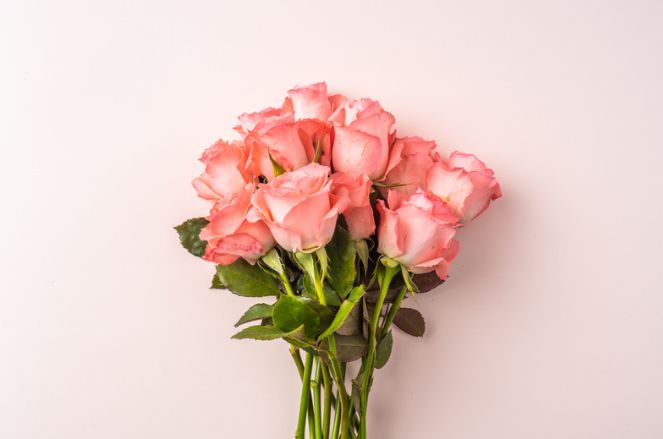
Roses are perhaps the most iconic choice for wedding bouquets, renowned for their classic beauty and deep symbolism. They have been a symbol of love and passion for centuries, with each colour offering a different meaning. Red roses signify deep love and respect, white roses symbolize purity and innocence, and pink roses express admiration and gratitude. Their versatility and wide range of colours make roses a favourite for personalizing wedding themes and expressing romantic sentiments.
Lilies of the Valley
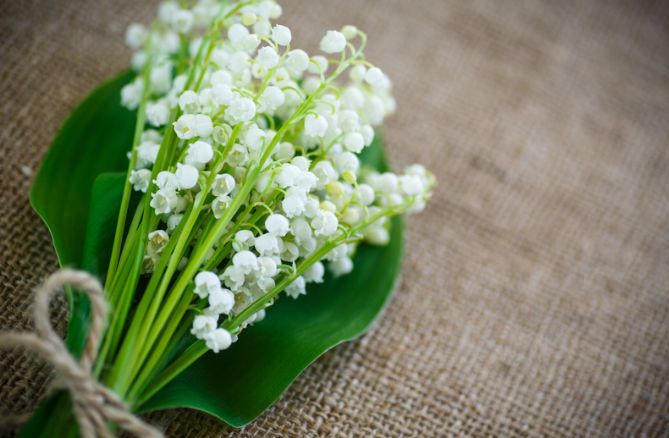
With their delicate bell-shaped flowers and sweet scent, lilies of the valley bring a touch of grace and purity to wedding bouquets. They symbolize purity, happiness, and the return of happiness, making them a poignant choice for your wedding day. Due to their delicate nature, lilies of the valley are often used sparingly but can make a significant impact when combined with other flowers or as a simple, standalone bouquet.
Ranunculus
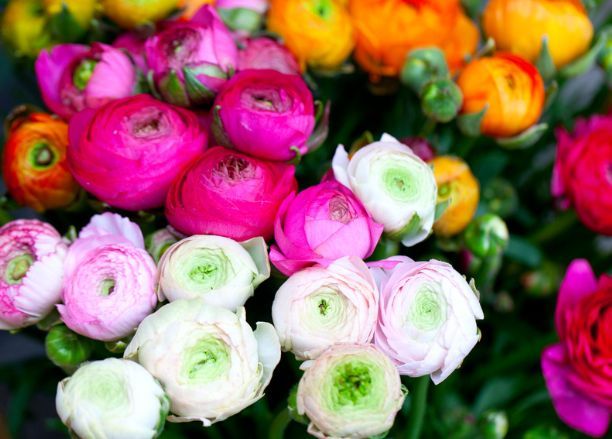
Ranunculus flowers are known for their tightly layered petals and vibrant colours, symbolizing radiant charm and attractiveness. These blooms are a popular choice for brides seeking a sophisticated and elegant look for their bouquet. Ranunculus works well with other flowers or as a stunning focal point in a simpler arrangement.
DIY vs. Professional Florists
When creating the perfect wedding bouquet, couples often decide between a DIY approach or hiring a professional florist. Each option has its own set of advantages and considerations, making it important to weigh the pros and cons based on your personal preferences, budget, and wedding vision.
Pros and Cons of DIY Bouquets
Pros:
- Personal Touch: DIY bouquets allow you to infuse your personality and style into your wedding in a very hands-on way. Each flower can be chosen for its meaning to you, creating a deeply personal and unique bouquet.
- Budget-Friendly: Opting for a DIY approach can be more cost-effective, especially if you have access to wholesale flowers or decide to use blooms from your own garden.
- Satisfaction: There’s a sense of accomplishment and satisfaction in creating something beautiful for your wedding day, adding to the emotional significance of your bouquet.
Cons:
- Time and Effort: Crafting your own bouquet requires significant time and effort, especially if you’re not experienced. The process can be more time-consuming and stressful than anticipated.
- Skill Level: Achieving a professional-looking bouquet requires a certain level of skill and creativity. Without experience, creating the bouquet you envisioned might be challenging.
- Availability of Flowers: Depending on the season and your location, it might be difficult to source specific flowers, limiting your options for your DIY bouquet.
Tips for Working with a Professional Florist
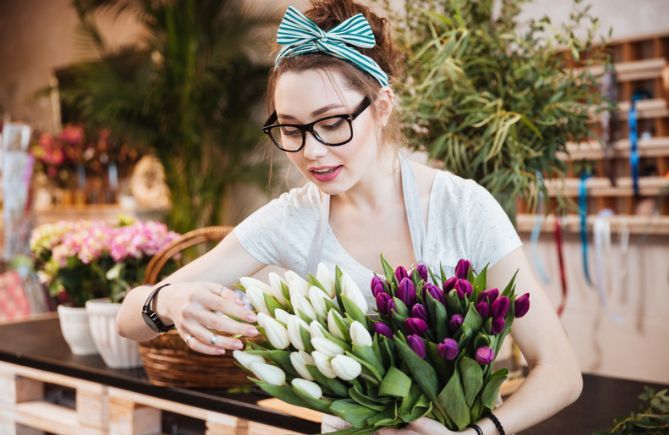
Communicate Clearly: Share your vision, colour scheme, and any specific flowers you love or dislike. Providing inspirational photos can help your florist understand your style and preferences.
- Be Open to Suggestions: Florists are experts in their field and can offer valuable advice on flower choices, colour combinations, and styles that you might not have considered. They can suggest alternatives that align with your vision while being seasonally available and within your budget.
- Discuss Your Budget Upfront: Be honest about your budget from the beginning. A good florist will work with you to explore options that fit within your financial constraints without compromising the beauty of your bouquet.
- Trust Their Expertise: Once you’ve communicated your desires, trust your florist to bring your vision to life. They have the experience and skills to create a bouquet that meets and exceeds your expectations.
- Review Past Work: Before deciding, review the florist’s portfolio to ensure their style aligns with your wedding aesthetic. This can give you confidence in their ability to deliver your dream bouquet.
- Choosing between a DIY bouquet and working with a professional florist depends on your preferences, budget, and wedding needs. DIY offers a personal and potentially budget-friendly approach, while professional florists provide expertise, convenience, and access to a broader range of flowers. Whichever route you choose, the goal is to have a wedding bouquet that reflects your personality and enhances the beauty of your special day.
Care and Handling of Your Wedding Bouquet
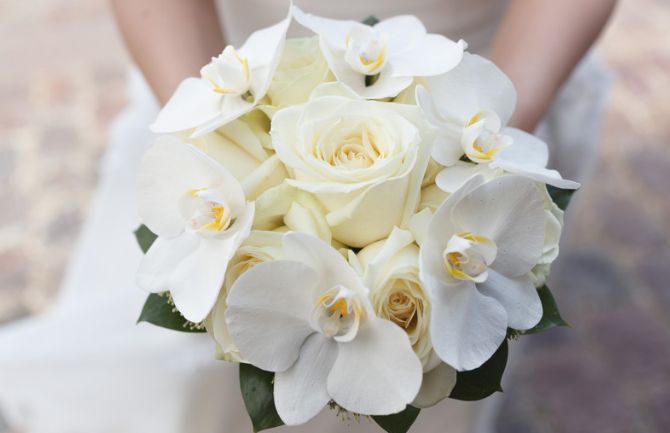
Your wedding bouquet is a beautiful accessory on your big day and can serve as a lasting memory of the occasion if cared for properly. Understanding how to maintain and preserve your bouquet ensures it remains as stunning as the moment you walked down the aisle, from the pre-wedding preparations to the post-wedding preservation.
Pre-Wedding Care
The key to a fresh and vibrant bouquet is proper care leading up to the ceremony. Here are some essential tips to ensure your flowers look their best:
- Keep It Hydrated: Place your bouquet in a vase filled with fresh, cool water as soon as you receive it. Most flowers thrive in water, and this will help keep them vibrant and lively.
- Store in a Cool Place: Flowers are sensitive to temperature and can wilt or brown in direct sunlight or heat. Find a cool, shaded spot to store your bouquet until it’s time for the ceremony. A refrigerator can be used for short-term storage, but keep fruits and vegetables away, as they can release gases that may wilt the flowers.
- Avoid Handling: Try to handle the bouquet as little as possible before the ceremony to prevent any bruising or damage to the petals and stems.
- Trim Stems: If you’re comfortable doing so, trimming the stems diagonally about an inch from the bottom can help the flowers absorb water more efficiently. Use a sharp knife or a pair of floral scissors to avoid crushing the stems.
Post-Wedding Preservation
After the wedding, you may want to preserve your bouquet as a keepsake. There are several methods for preserving flowers, each with its charm:
- Drying: Hang your bouquet upside down in a warm, dry, and dark place for a few weeks. This method is simple and maintains the shape of your bouquet, though the colours may fade slightly.
- Pressing: For more artistic preservation, select a few blooms to press in a heavy book. Place the flowers between parchment paper and leave them under a heavy weight for a few weeks. Pressed flowers can be framed as a beautiful reminder of your day.
- Professional Preservation: Professional services can freeze-dry your bouquet, maintaining its three-dimensional shape and colour. This method can be more expensive but results in a stunning and lasting memento.
- Silica Gel: Silica gel can dry out flowers while maintaining their shape and colour better than air-drying. Place the flowers in a container and completely cover them with silica gel for about a week or until completely dry.
Choose Tina Kristen Weddings for Hair and Makeup
As you embark on this beautiful journey towards your wedding day, don’t forget to consider the finishing touches that make your celebration all the more memorable. For brides seeking to look and feel their absolute best,
Tina Kristen Weddings offers exceptional wedding makeup services tailored to highlight your natural beauty. Let us be part of your special day, ensuring you shine from the aisle to the altar.
Reach out to us today.
FAQs
Q: How Far in Advance Should I Choose My Wedding Flowers?
Ideally, start discussing your flowers with your florist 6 to 9 months before your wedding to ensure availability and to make any necessary adjustments to your plans.
Q: Can I Mix Seasonal and Non-seasonal Flowers in My Bouquet?
Yes, you can mix seasonal with non-seasonal flowers, though it may affect the cost. Your florist can advise you on the best combinations.
Q: How Do I Choose a Wedding Bouquet That Complements My Dress?
Consider the style of your dress. A simple gown might pair well with a bold bouquet, while a detailed dress could complement a more understated arrangement.
Q: What Are Some Eco-Friendly Wedding Flower Options?
Opt for locally grown, seasonal flowers, use more greenery, or consider potted plants that can be replanted after the wedding.
Q: How Can I Repurpose My Wedding Flowers After the Ceremony?
Donate them to a hospital or nursing home, repurpose them for your reception décor, or give them as thank-you gifts to guests and family.

